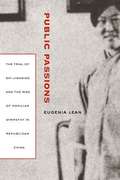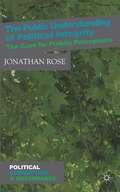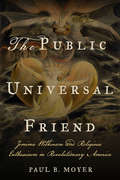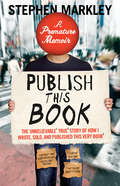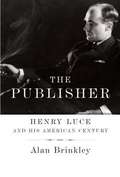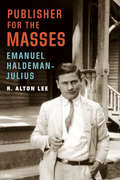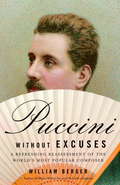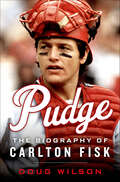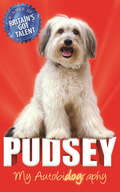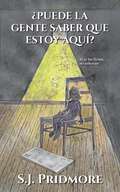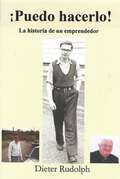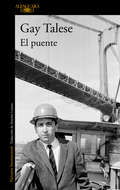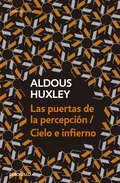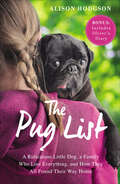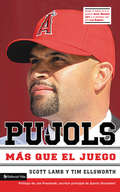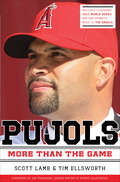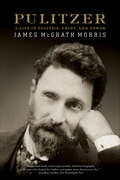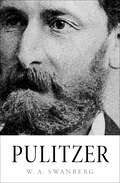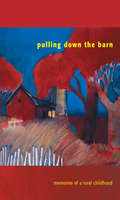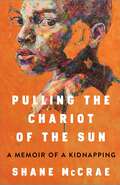- Table View
- List View
Public Passions: The Trial of Shi Jianqiao and the Rise of Popular Sympathy in Republican China
by Eugenia LeanIn 1935, a Chinese woman called Shi Jianqiao murdered the notorious warlord Sun Chuanfang as he prayed in a Buddhist temple. This work of history examines this crime and the highly sensationalized trial of the killer. In a fascinating investigation of the media, political, and judicial records surrounding this cause celebre, Eugenia Lean shows how Shi Jianqiao planned not only to avenge the death of her father, but also to attract media attention and galvanize public support.
The Public Understanding of Political Integrity
by Jonathan RoseThrough detailed analyses of major and newly available datasets, this study examines the utility of a public probity-focused approach to understanding citizen disaffection with politicians. It shows that perceptions of public probity are coherent, substantively meaningful, responsive, and, most importantly, that they do matter.
The Public Universal Friend: Jemima Wilkinson and Religious Enthusiasm in Revolutionary America
by Paul B. MoyerAmid political innovation and social transformation, Revolutionary America was also fertile ground for religious upheaval, as self-proclaimed visionaries and prophets established new religious sects throughout the emerging nation. Among the most influential and controversial of these figures was Jemima Wilkinson. Born in 1752 and raised in a Quaker household in Cumberland, Rhode Island, Wilkinson began her ministry dramatically in 1776 when, in the midst of an illness, she announced her own death and reincarnation as the Public Universal Friend, a heaven-sent prophet who was neither female nor male. In The Public Universal Friend, Paul B. Moyer tells the story of Wilkinson and her remarkable church, the Society of Universal Friends. Wilkinson's message was a simple one: humankind stood on the brink of the Apocalypse, but salvation was available to all who accepted God's grace and the authority of his prophet: the Public Universal Friend. Wilkinson preached widely in southern New England and Pennsylvania, attracted hundreds of devoted followers, formed them into a religious sect, and, by the late 1780s, had led her converts to the backcountry of the newly formed United States, where they established a religious community near present-day Penn Yan, New York. Even this remote spot did not provide a safe haven for Wilkinson and her followers as they awaited the Millennium. Disputes from within and without dogged the sect, and many disciples drifted away or turned against the Friend. After Wilkinson’s "second" and final death in 1819, the Society rapidly fell into decline and, by the mid-nineteenth century, ceased to exist. The prophet’s ministry spanned the American Revolution and shaped the nation’s religious landscape during the unquiet interlude between the first and second Great Awakenings. The life of the Public Universal Friend and the Friend’s church offer important insights about changes to religious life, gender, and society during this formative period. The Public Universal Friend is an elegantly written and comprehensive history of an important and too little known figure in the spiritual landscape of early America.
Publish This Book: The Unbelievable True Story of How I Wrote, Sold and Published This Very Book
by Stephen MarkleyDear Reader-This is called the "back cover copy," and you are no doubt familiar with its purpose. It describes what the book is about, so you can decide if you want to read it. Here's the problem, though: I can't even describe this book, and I wrote the damn thing. (1)Basically, it's like this: fed up with the Byzantine quest of trying to publish a novel, I decide instead to cut to the chase and write a memoir about trying to publish a book--this book, to be precise. Of course, now you're saying to yourself, "That is stupid," which is fair. But then you'll read it, and you'll say, "Damn, that was actually pretty good. "Because obviously it's about much more than just publishing a book. It's about life and love and friendship; politics, pop culture, and basketball; sex, drugs, and mild, inoffensive, slow-tempo Christian rock. (2)It's about the pitfalls of narrating your life as it unfolds, freaking out when an agent actually (spoiler alert!) takes an interest in this bizarre experiment, and the surreal shock you undergo when a publisher actually buys it(3) and you suddenly realize that every secret drunk, drug, and sex story you've related will now be required reading for your parents, aunts, ex-girlfriends, and thousands of strangers who-you were kind of hoping-would never find out that you once accidentally shut your penis in a dresser drawer. (4)And finally, but most importantly, it's about those tumultuous early years of adulthood-the years when hope and fear and rage broil together and the promise of youth still holds the capacity to inspire awe. This is a story of those struggles-to find your true voice in your work and in your life. And the best part?You pretty much know it has a happy ending. (5)2 It is not really about that last one. 3 And then later makes you write your own back cover copy even though you clearly do not know what you're doing. 4 Although I'll dodge a bullet there because I totally left that story out of the book. 5 Except for what happens to the puppy at the fertilizer plant. I admit, that part is kind of a downer.
The Publisher: Henry Luce and His American Century
by Alan BrinkleyAcclaimed historian Alan Brinkley gives us a sharply realized portrait of Henry Luce, arguably the most important publisher of the twentieth century. As the founder of Time, Fortune, and Life magazines, Luce changed the way we consume news and the way we understand our world. Born the son of missionaries, Henry Luce spent his childhood in rural China, yet he glimpsed a milieu of power altogether different at Hotchkiss and later at Yale. While working at a Baltimore newspaper, he and Brit Hadden conceived the idea of Time: a "news-magazine" that would condense the week's events in a format accessible to increasingly busy members of the middle class. They launched it in 1923, and young Luce quickly became a publishing titan. In 1936, after Time's unexpected success - and Hadden's early death - Luce published the first issue of Life, to which millions soon subscribed. Brinkley shows how Luce reinvented the magazine industry in just a decade. The appeal of Life seemingly cut across the lines of race, class, and gender. Luce himself wielded influence hitherto unknown among journalists. By the early 1940s, he had come to see his magazines as vehicles to advocate for America's involvement in the escalating international crisis, in the process popularizing the phrase "World War II. " In spite of Luce's great success, happiness eluded him. His second marriage - to the glamorous playwright, politician, and diplomat Clare Boothe - was a shambles. Luce spent his later years in isolation, consumed at times with conspiracy theories and peculiar vendettas. The Publisher tells a great American story of spectacular achievement - yet it never loses sight of the public and private costs at which that achievement came.
Publisher for the Masses, Emanuel Haldeman-Julius
by R. Alton LeeHis admirers called him the “Barnum of Books” and the “Voltaire of Kansas” because of his ability to bring culture and education to the people. R. Alton Lee brings to life Emanuel Haldeman-Julius (1889–1951), a writer-publisher-entrepreneur who was one of America’s most significant publishers and editorialists of the twentieth century. His company published a record 500,000,000 copies of 2,580 titles and was second only to the U.S. Government Printing Office in the quantity of publications it produced. Lee details Haldeman-Julius’s family origins in Russia and his formative years in Philadelphia, where he learned the book trade. As a writer and editor for the Social Democrat, Sunday Call, and Western Comrade, Haldeman-Julius was already well known by the time he launched his own publishing company. Haldeman-Julius knew, was nurtured by, and published writers such as Jack London, Upton Sinclair, Jane Addams, Emma Goldman, H. L. Mencken, Carl Sandburg, Eugene V. Debs, Clarence Darrow, Job Harriman, Will Durant, and Bertrand Russell, among others. Based in Girard, Kansas, his company, Haldeman-Julius Publications, covered socialist politics, the philosophy of free thought, and both new and classic books marketed to ordinary Americans, including the Little Blue Book series of classics in Western thought and literature. This biography of the enigmatic and energetic Haldeman-Julius opens a window into the fascinating world of early twentieth-century radical politics and publishing.
Puccini Without Excuses: A Refreshing Reassessment of the World's Most Popular Composer
by William BergerPuccini is the most beloved composer of opera in the world: one quarter of all opera performances in the U.S. are of his operas, his music pervades movie soundtracks, and his plots have infiltrated our popular culture. But, although Puccini’s art still captivates audiences and the popularity of such works as Tosca, La Boh?me, and Madama Butterfly has never waned, he has long been a victim of critical snobbery and cultural marginalization.In this witty and informative guide for beginners and fans alike, William Berger sets the record straight, reclaiming Puccini as a serious artist. Combining his trademark irreverent humor with passionate enthusiasm, Berger strikes just the right balance of introductory information and thought-provoking analysis. He includes a biography, discussions of each opera, a glossary, fun facts and anecdotes, and above all keen insight into Puccini’s enduring power. For anyone who loves Puccini and for anyone who just wonders what all the fuss is about, Puccini Without Excuses is funny, challenging, and always a pleasure to read. INCLUDES:_ Why Puccini’s art and its message of hope is crucial to our world today_ How Anglo audiences often miss the mythic significance of his operas_ The use of his music as shorthand in films, from A Room with a View to Fatal Attraction_ A scene-by scene analysis of each opera_ A guide to the wealth of available recordings, books, and videos
Pudge: The Biography of Carlton Fisk
by Doug WilsonPudge marks the first biography of the Hall of Fame catcher, whose famous home run in the 1975 World Series has been called one of the greatest moment in the history of televised sport.Carlton Fisk retired having played in more games and hit more home runs than any other catcher before him. A baseball superstar in the 1970s and 80s, Fisk was known not just for his dedication to the sport and tremendous plays but for the respect with which he treated the game.A homegrown icon, Fisk rapidly became the face of one of the most storied teams in baseball, the Boston Red Sox of the 1970s. As a rookie making only $12,000 a year, he became the first player to unanimously win the American League Rookie of the Year award in 1972, upping both his pay grade and national recognition. Fisk's game-winning home run in Game Six of the hotly-contested 1975 World Series forever immortalized him in one of the sport's most exciting televised moments. Fisk played through an epic period of player-owner relations, including the dawn of free agency, strikes, and collusions. After leaving Boston under controversy in 1981, he joined the Chicago White Sox, where he played for 12 more major league seasons, solidifying his position as one of the best catchers of all time.Doug Wilson, finalist for both the Casey Award and Seymour Medal for his previous baseball biographies, uses his own extensive research and interviews with childhood friends and major league teammates to examine the life and career of a leader who followed a strict code and played with fierce determination.
Pudsey: A Pup Star's Story
by PudseyLast year, a dog danced his way into the history books as the first canine winner of Britain's Got Talent. On their way to the title, Pudsey and his owner Ashleigh Butler won over Walliams, delighted Dixon, stole the heart of Holden, and utterly captivated Cowell. They charmed the nation, too - with millions of families tuning in to see them take the crown.As a young pup, Pudsey always knew he was somehow different to other puppies. While his brothers and sisters contented themselves with chasing their tails, he sat apart, hoping for something more. Pudsey: A Pup Star's Story tells the story of his incredible, inspirational journey, straight from the dog's mouth.
Pudsey: My Autobidography
by PudseyEarlier this year, a dog danced his way into the history books as the first canine winner of Britain's Got Talent. En route to the title, Pudsey and his owner Ashleigh Butler won over Walliams, delighted Dixon, stole the heart of Holden, and utterly captivated Cowell. They charmed the nation, too - with millions of viewers tuning in to see them take the crown. But what do we really know of Pudsey's journey to stardom? How did he get from being a depressed dog to the mutt of the moment? In this, the most unusual celebrity book of the year, he's finally ready to tell his tale. As a young pup, Pudsey always knew he was somehow different to his dog-standard peers. While his brothers and sisters contented themselves with chasing their tails, he sat apart, yearning for something more. With the help of the menagerie of pets that fill the Butler household and despite some dastardly opposition threatening to stop him at every turn, Pudsey managed to achieve his dream. This Autobidography tells the story of his incredibly journey, straight from the dog's mouth.
Pudsey: My Autobidography
by PudseyEarlier this year, a dog danced his way into the history books as the first canine winner of Britain's Got Talent. En route to the title, Pudsey and his owner Ashleigh Butler won over Walliams, delighted Dixon, stole the heart of Holden, and utterly captivated Cowell. They charmed the nation, too - with millions of viewers tuning in to see them take the crown.But what do we really know of Pudsey's journey to stardom? How did he get from being a depressed dog to the mutt of the moment? In this, the most unusual celebrity book of the year, he's finally ready to tell his tale.As a young pup, Pudsey always knew he was somehow different to his dog-standard peers. While his brothers and sisters contented themselves with chasing their tails, he sat apart, yearning for something more. With the help of the menagerie of pets that fill the Butler household and despite some dastardly opposition threatening to stop him at every turn, Pudsey managed to achieve his dream. This Autobidography tells the story of his incredibly journey, straight from the dog's mouth.
Pudsey: A Pup Star's Story
by PudseyLast year, a dog danced his way into the history books as the first canine winner of Britain's Got Talent. On their way to the title, Pudsey and his owner Ashleigh Butler won over Walliams, delighted Dixon, stole the heart of Holden, and utterly captivated Cowell. They charmed the nation, too - with millions of families tuning in to see them take the crown.As a young pup, Pudsey always knew he was somehow different to other puppies. While his brothers and sisters contented themselves with chasing their tails, he sat apart, hoping for something more. Pudsey: A Pup Star's Story tells the story of his incredible, inspirational journey, straight from the dog's mouth.
¿Puede la gente saber que estoy aquí?
by S. J. PridmoreLa niña no entiende por qué le ha tocado vivir una vida tan cruel. Mientras, una joven madre se ve obligada a tomar una decisión imposible para salvar su vida y la de sus hijos. Ambas se encuentran solas en medio de un mundo hostil. Necesitan seguir libres si quieren sobrevivir. Porque jamás volverán si se las llevan, y es posible que el impetuoso espíritu que comparten no sea suficiente. Será necesaria la intervención de amables extraños y un golpe de suerte si han de tener alguna posibilidad de encontrar santuario. Sin embargo, son muchas las adversidades. Y no todos los extraños serán amables. Basado en una historia real.
¡Puedo hacerlo!
by Dieter RudolphSer inmigrante en otro país con un idioma y costumbres diferentes es un desafío. Este libro está escrito por un hombre muy joven, con solo cuatro años de educación en una escuela secundaria moderna inglesa sin buenos resultados, ya que durante los primeros años luchó con el idioma. Ser alemán justo después de la Segunda Guerra Mundial trajo desafíos adicionales. A la edad de quince años, comenzó a trabajar como ayudante de electricista y, a la edad de 32 años, alcanzó el puesto de director ejecutivo de una empresa de distribución recién formada para un fabricante francés internacional. Esta increíble historia de logros continuó en direcciones muy diferentes y en una serie de industrias. Un emprendedor ilustra lo que se puede lograr cuando se aplica un trabajo arduo y dedicado. Al final, se piensa en la propiedad de la empresa y se habilita, con consecuencias que mostrarán a los lectores cómo superar grandes obstáculos, incluido asumir la deshonestidad de los banqueros y ganar.
El puente
by Gay TaleseEl Maestro del Periodismo narra una auténtica epopeya humana: la crónica de la construcción de un puente convertida en un nuevo clásico. «Talese cuenta historias cálidas, divertidas y trágicas sobre hombres, mujeres, acero y hormigón. Una buena lectura.»Denver Post «Llegan a la ciudad en coches enormes, viven en habitaciones amuebladas, beben whisky acompañado de chupitos de cerveza y persiguen a mujeres que no tardarán en olvidar. Se quedan poco tiempo, no más del que necesitan para construir el puente.» A finales de 1964 se completaron las obras del puente de Verrazano-Narrows, que une Brooklyn y Staten Island y que, medio siglo después, sigue considerándose un prodigio de la ingeniería: con sus 4.176 metros de longitud, es el puente colgante más largo de Estados Unidos y el sexto del mundo. Gay Talese, que siguió de cerca el levantamiento de este monumento al esfuerzo del hombre, recogió en El puente las historias humanas que se hallaban tras su construcción, desde el día a día de los obreros que trabajaban sobre vigas a alturas de vértigo hasta los acuerdos a puerta cerrada que desplazarían vecindarios enteros para dar cabida a la bestia. Un relato fascinante de intrigas políticas y de coraje, y una demostración del talento de Talese como cronista y narrador de historias. Reseñas:«Una crónica brillante. Describe con emoción a la gente que participó en el proyecto. Ve en el puente un logro humano más que mecánico, y aporta drama y aventura a la historia de su construcción.»The New York Times Book Review «Este libro tiene el encanto de I Cover the Waterfront, de Max Miller, y la precisión de Muerte en la tarde, de Hemingway.»St. Louis Post-Dispatch «Solo un escritor enamorado de su materia puede producir un relato tan fascinante. Hay muchas historias dentro de El puente, y todas merecen ser leídas.»Houston Post «Un relato maravilloso en el que combina tristeza, humor, peligro, muerte y angustia, y que al lector le resultará difícil dejar.»Arizona Republic «Un relato fascinante y atractivo. Un drama absorbente y maravillosamente escrito.»Times Union «Talese cuenta historias cálidas, divertidas y trágicas sobre hombres, mujeres, acero y hormigón. Una buena lectura.»Denver Post
Las puertas de la percepción / Cielo e infierno
by Aldous HuxleyDos ensayos que propugnan una nueva visión maravillosamente depurada bajo la acción de la droga y que son en sí mismos experiencias de trascendencia del yo. «Si las puertas de la percepción quedaran depuradas, todas las cosas aparecerían ante el hombre tal como son: infinitas.»William Blake Huxley es uno de los primeros escritores del siglo XX que trató de descubrir los "cambios objetivos" provocados por la ingestión de drogas alucinógenas. En Las puertas de la percepción (1954), el autor narra la fantástica experiencia visionaria que le provoca la toma de mescalina, el principio activo del peyotl. Dos años más tarde publica Cielo e infierno, en el que continúa explorando la unidad entre la mente y el cosmos. Dos ensayos que propugnan una nueva visión maravillosamente depurada bajo la acción de la droga y que son en sí mismos experiencias de trascendencia del yo.
A Puerto Rican in New York and Other Sketches
by Jesús Colón Juan FloresWarm, often humorous, thoughtful true-to-life socio-political vignettes by the late journalist and barrio-laureate.
The Pug List (with Bonus Content): A Ridiculous Little Dog, a Family Who Lost Everything, and How They All Found Their Way Home
by Alison HodgsonBONUS CONTENT INCLUDED: Includes Oliver’s Diary a 24-page enhanced ebook with full-color photographs, videos and diary entries from The Real Pug Oliver.How do you recover when your life as you know it is burned down to the ground? That’s exactly what happened to Alison Hodgson and her family, when an arsonist singlehandedly turned their home into a crime scene overnight. The Pug List is a story of a family who lost everything but each other, a ridiculous orphan pug, and the unexpected ways we all find our way home as guided by God’s unconventional grace.
Pujols: Más allá del béisbol
by Scott Lamb Tim EllsworthDespués de una década de estrellato en los Cardenales del Saint Louis, Albert Pujols es comparado ya con jugadores cuyos nombres figuran en lo más alto del panteón del béisbol: Ruth, Gehrig, Aaron, Mays. Abriéndose paso con su bate hasta el Salón de la Fama, Pujols ha levantado el estándar de grandeza del juego por encima de todas las medidas estadísticas. Pero el estándar por el cual Pujols se mide a sí mismo tiene menos que ver con el béisbol que con su deseo de honrar a Dios y dar ejemplo de su fe ante sus millones de seguidores. Los autores Scott Lamb y Tim Ellsworth no nos dejan sin contar ninguna historia de esta leyenda del béisbol aún en crecimiento, al mismo tiempo que destacan “la mano invisible de la divina providencia”, que le ha dado forma al hombre en que Albert Pujols se ha convertido. Es un relato inspirador, y un recuerdo de la calidad de un ser humano detrás de unos logros sobrehumanos.
Pujols Revised & Updated: More Than the Game
by Scott Lamb Tim EllsworthAfter a decade starring for the St. Louis Cardinals, Albert Pujols is already compared with names in the highest reaches of baseball's pantheon: Ruth, Gehrig, Aaron, Mays. Slugging his way toward the Hall of Fame, Pujols has raised the game's standard for greatness beyond any statistical measure. But the standard by which Pujols measures himself has less to do with baseball performance than with honoring God and exemplifying his faith for the millions who follow him.From his birthplace in the Dominican Republic to his high-school days in Kansas City, from a single season in the minor leagues to the World Series and nine All-Star Games, Pujols has developed his immense talents on the baseball diamond, all the while focusing his direction--and the direction of his family--with the belief that a higher power is behind every achievement.Authors Scott Lamb and Tim Ellsworth spare no tale of this growing baseball legend, all the while accentuating "the unseen hand of divine providence" that has shaped the man Albert Pujols has become. It's a story that will inspire, and a reminder of the human quality behind superhuman achievement.A story--still in the making--of allowing God's strength to guide one man's path to be the best his game has ever seen.His numbers are staggering.In 2010 Albert Pujols became the first player in baseball history to bat .300 with 30 home runs and 100 runs batted in for ten consecutive seasons. Babe Ruth didn't do it. Ted Williams didn't do it. Hank Aaron didn't do it. The fact that this was accomplished in Pujols' first ten seasons only makes the achievement more, well, Ruthian.Albert Pujols' story goes beyond numbers, though. Beyond the bright lights and packed stadiums of Major League Baseball. Even beyond the adulation of millions who have come to see the St. Louis Cardinal star as the rare "once-in-a-lifetime-player" who transcends team loyalties.Through the 2010 season, Pujols hit 408 home runs. And every time he touched home plate after sending another baseball to a random bookshelf or trophy case, Pujols pointed heavenward. Toward the strength behind his otherworldly talents, toward the inspiration that lifts him on a daily basis, regardless of his team's place in the standings. For Jesus Christ is Albert Pujols' first love. Faith, family, then maybe baseball.Endorsements:"He matches in his personal life the excellence that he demonstrates on the diamond. You will love this book and will love Pujols if you don't already." --Mike Huckabee , 44th Governor of Arkansas, Former Republican presidential candidate, Host of Fox News ' Huckabee Show, Best-selling authorBut Pujols' argument for greatest player ever isn't nearly as interesting or significant as the fact that there even is an argument. That's because perhaps the most amazing thing about Albert Pujols is that less than two years before he began one of the greatest rookie seasons in baseball history, he was a non-prospect." -Joe Posnanski, Senior Writer at Sports Illustrated (included in the Foreword) "Pujols is full of nuggets. Given that the action in the famous poem "Casey at the Bat" starts with "Cooney died at first, and Barrows did the same," I enjoyed reading that Albert Pujols asks opposing runners at first base, "If you died today, where do you think you're going to go?" Lamb and Ellsworth lucidly describe both the season-by-season baseball exploits of Pujols and the impact he's having on some lives for eternity." -Marvin Olasky, Editor-in-chief, World
Pulitzer: A Life in Politics, Print, and Power
by James McGrath MorrisLike Alfred Nobel, Joseph Pulitzer is better known today for the prize that bears his name than for his contribution to history. Yet, in nineteenth-century industrial America, while Carnegie provided the steel, Rockefeller the oil, Morgan the money, and Vanderbilt the railroads, Pulitzer ushered in the modern mass media. James McGrath Morris traces the epic story of this Jewish Hungarian immigrant's rise through American politics and into journalism where he accumulated immense power and wealth, only to fall blind and become a lonely, tormented recluse wandering the globe. But not before Pulitzer transformed American journalism into a medium of mass consumption and immense influence. As the first media baron to recognize the vast social changes of the industrial revolution, he harnessed all the converging elements of entertainment, technology, business, and demographics, and made the newspaper an essential feature of urban life. Pulitzer used his influence to advance a progressive political agenda and his power to fight those who opposed him. The course he followed led him to battle Theodore Roosevelt who, when President, tried to send Pulitzer to prison. The grueling legal battles Pulitzer endured for freedom of the press changed the landscape of American newspapers and politics. Based on years of research and newly discovered documents, Pulitzer is a classic, magisterial biography and a gripping portrait of an American icon.
Pulitzer
by W. A. SwanbergFrom the National Book Award–winning author, an absorbing biography of the esteemed editor, publisher, power broker, and rival to William Randolph Hearst. An eccentric genius, Joseph Pulitzer immigrated to the United States to fight in the Civil War—despite barely speaking English. He would soon master the language enough to begin a successful newspaper career in St. Louis, become a fierce opponent to William Randolph Hearst, and, eventually, found the Columbia School of Journalism. A Hungarian born into poverty, Pulitzer epitomized the American Dream by building a fortune. But he also suffered: going blind in the middle of his career, experiencing extreme mood swings, and developing an intense irritability that made everyday life difficult to tolerate. In this book, W. A. Swanberg—a recipient of the prestigious prize named after Pulitzer—recounts the personal and professional life of the newspaper magnate, as well as his significant influence on American politics. Swanberg reveals how the New York World managed to balance admirably accurate reporting with popular appeal, and explores Pulitzer&’s colorful, contradictory character—courageous and self-pitying, dictatorial and generous. Set against the backdrop of a turbulent era, this is a portrait of an outsize personality by an author with a flair for both the big picture and small, fascinating detail.Includes photographs.Praise for W. A. Swanberg&’s biographies &“First-rate.&” —The New York Times on Citizen Hearst &“Engrossing.&” —Kirkus Reviews on Norman Thomas: The Last Idealist
Pulling Down the Barn: Memories of a Rural Childhood
by Anne-Marie OomenBlending artful language and style with the dirt, blood, and sweat of farm life, this collection of essays tells a moving story of growing up in rural Michigan.
Pulling Down the Walls: The Struggle of African American Performers
by Rena KorbNIMAC-sourced textbook
Pulling the Chariot of the Sun: A Memoir of a Kidnapping
by Shane McCraeAn unforgettable memoir by an award-winning poet about being kidnapped from his Black father and raised by his white supremacist grandparents.When Shane McCrae was three years old, his grandparents kidnapped him and took him to suburban Texas. His mom was white and his dad was Black, and to hide his Blackness from him, his maternal grandparents stole him from his father. In the years that followed, they manipulated and controlled him, refusing to acknowledge his heritage—all the while believing they were doing what was best for him. For their own safety and to ensure the kidnapping remained a success, Shane&’s grandparents had to make sure that he never knew the full story, so he was raised to participate in his own disappearance. But despite elaborate fabrications and unreliable memories, Shane begins to reconstruct his own story and to forge his own identity. Gradually, the truth unveils itself, and with the truth, comes a path to reuniting with his father and finding his own place in the world. A revelatory account of a singularly American childhood that hauntingly echoes the larger story of race in our country, Pulling the Chariot of the Sun is written with the virtuosity and heart of one of the finest poets writing today. And it is also a powerful reflection on what is broken in America—but also what might heal and make it whole again.
